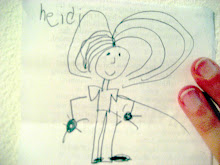The first rule of book club is you do not talk about book club.
Yesterday I led a couple of book groups at the county juvenile detention facility. The participants were all girls in their teens. The first group was in a lock down unit, meaning the girls are locked in their rooms unless they are participating in a scheduled activity. It took quite a while just to enter the building. There wasn't a guard stationed at the front door, so we had to ring a buzzer and wait for someone to come down and collect us. Next was a metal detector, which felt a little bit like airport security. I took off my studded belt and keys, but got to walk through with my shoes on. The other librarian and I stood in the waiting room for a bit until someone from the girls unit came to collect us.
The facility is brand new, with fresh paint everywhere and a beautiful atrium planted with native grasses. It hasn't been open long enough for dust to have settled in the corners; if it weren't for all of the locked doors, you could almost imagine it was a high school or a college dorm. It took a while to reach the girls. There were lots of hallways that all looked exactly the same, and every 20 feet or so we had to press a button and wait for some unseen guard to buzz us through a door.
I facilitated an adult book group a few years ago, but this is my first with teens. The group was small, just five girls. Book group is at the same time as AA, so we don't get all the girls on the unit. We walked in and right away two or three of them said, "I didn't like the book."
I was okay with that. When I think back to some of the books that I was forced to read in school, I disliked most of them on principle. The fact that they didn't like it meant that they had actually read it, and that they had strong opinions about it. I can work with that.
We started with introductions, then we spent about 30 minutes or so talking about the book -- the graphic novel/comic book Persepolis by Marjane Satrapi. I owned up to choosing the book and told them they could blame me if they didn't like it. I explained why I like the book: I like to learn about different cultures and different countries. I don't know a whole lot about Iran, and I thought this would be a good way to learn something. It's a novel about growing up, and I like learning about the experiences that make someone who they are. I like that she shares a bunch of really difficult experiences without becoming maudlin. (Okay, so I didn't say maudlin. I said, "without becoming all boo-hoo-woe-is-me.")
They thought the book was confusing, they didn't understand all of the stuff about the Shah and her grandfather being a prince. And why the teachers taught them one thing before the revolution and something else after. I pointed out that Marji is ten when the book begins and asked them if they thought she would have understood everything going on when she was so young. They got it right away, and I could see their opinion of the book starting to shift. They were critical of the teachers because they lied to the students. I reminded them that Marji's parents didn't always tell her the truth, either. How was that different? All in all it was a great discussion.
The second group was bigger, about 15 or 16 girls. This group was referred to as "the camp," and the girls aren't locked in their rooms. I photocopied pages of the book with the dialog blocked out and had the girls fill in the text. Lots of creative stuff from the girls...some of it funny, some of it banal, some of it quite serious, though when it came time to share, even the serious stuff was read aloud through a veneer of giggles.
Later that night I went to a screening of Delicatessen in a park near my apartment. An appropriately surreal sequel to the first half of my evening.
I'm looking forward to hearing what they have to say next week.


